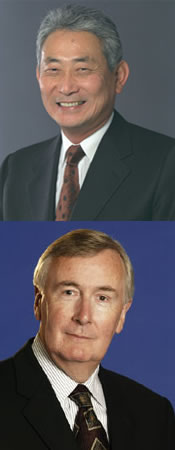
Minoru Arakawa and Howard Lincoln
It is only fitting and proper that Minoru Arakawa and Howard Lincoln are being jointly given the Academy of Interactive Arts and Sciences' inaugural Lifetime Achievement Award, because much of what made this duo of former Nintendo of America chiefs successful happened with them working in tandem.
Indeed, Nintendo's journey through the perilous universe that is the video game business often paralleled what some of the company's iconic characters had to go through in their adventures. Nintendo had to battle against insurmountable odds - as well as challenge bigger, bulkier foes in what could have been fights to the death. It had to establish itself in severely unfavorable conditions. When it started to find a level of success, adversaries came from all directions to take it on. Despite the challenges, Nintendo persevered and prospered under the leadership of Mr. Arakawa and Mr. Lincoln, and remained an innovative and inimitable force throughout the course of the "game."
Of course, this wasn't a game by any stretch of the imagination. Nintendo of America was trying to build itself into a global force at a time not long after Atari, Matrtel and Coleco saw their sales collapse. These three companies may have benefited from a lucrative rise in the U.S. home-game business in the late '70s and early '80s, but then they suffered during the industry crash around 1983 that left many wondering if video games were simply a flash-in-the-pan fad.
By the late '80s, though, Nintendo had not only revitalized the video game industry with its Nintendo Entertainment System, but it gained unprecedented market share - a near monoply over Sega and its Sega Master System. More importantly, in the time since then, it has created a sizable stable of lead characters that not only serve as capable protagonists in their respective game offerings, but are durable, popular brands that spark massive consumer purchases each time any of them appear in new titles. Mario, Luigi, Pokemon, and Zelda are household names, with Q Scores that rival the most popular TV and movie stars.
Nintendo also relentlessly sought out the best games to put on its systems. One story that illustrates Nintendo's ascension mirrors the twists and turns of the best John Grisham novel, but also demonstrates the lengths to which Mr. Arakawa and Mr. Lincoln would go to bring their company a victory - something that would give it an edge in such a competitive landscape. As described in David Sheff's "Game Over," the 1993 tome that documents how Nintendo came to power, the rights to Russian game maker Alexey Pajitnov's Tetris were tangled up among a few western companies. It soon became apparent that the messy web of legalities left open some holes.
Mr. Arakawa and Mr. Lincoln seized the opportunity and orchestrated a secretive, almost spy-like pursuit to land Tetris for its systems - most notably, its new Game Boy handheld. The tale is filled with intrigue, drama, and even a fair share of comedy, but the final result had Nintendo snatching the vital home-game rights to what would be one of the most significant game titles of its time. It offers a clear example of how driven the two executives were in assuring that Nintendo remained competitive - no matter how many time zones they'd have to cross...and no matter how many adversaries they'd have to battle.
Though neither Mr. Arakawa nor Mr. Lincoln continue at the helm of today's Nintendo of America, their previous efforts and influences still reonate at the company. Indeed, Nintendo has seen many ups and downs over the years, but its hardware and software continue to push the envelope of innovation. Its regularly sit among the leaders in the video game market's monthly anf annual sales charts, and much of it is due to the good work these two gentlemen did in the course of building a global videogame powerhouse.
The entire interactive industry owes Minoru Arakawa and Howard Lincoln a debt of gratitude for their contributions. The Academy salutes these two outstanding individuals, and recognizes their lifelong body of work in honoring them with the first-ever Lifetime Achievement Awards.


